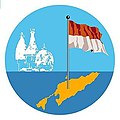1999 East Timorese independence referendum
| East Timor popular consultation, 1999 | ||||||||||
|---|---|---|---|---|---|---|---|---|---|---|
| Do you accept the proposed special autonomy for East Timor within the unitary state of the Republic of Indonesia? | ||||||||||
| ||||||||||
East Timor |
|---|
 |
This article is part of a series on the politics and government of Timor-Leste |
Constitution |
Executive
|
Legislature
|
Judiciary
|
Elections
|
Administrative divisions
|
Foreign relations
|
|
An independence referendum was held in East Timor on 30 August 1999. The referendum's origins lay with the request made by the President of Indonesia, B. J. Habibie, to the United Nations Secretary-General Kofi Annan on 27 January 1999, for the United Nations to hold a referendum, whereby the Indonesian province would be given choice of either greater autonomy within Indonesia or independence.
Contents
1 Background
1.1 Proposed special autonomy
2 Ballot paper and logos
3 Results
4 Reactions
5 References
6 External links
Background
In the preceding months, President Habibie had made various public statements whereby he mentioned that the costs of maintaining monetary subsidies to support the province were not balanced by any measurable benefit to Indonesia. Due to this unfavourable cost-benefit analysis, the most rational decision would be for the province, which was not part of the original 1945 boundaries of Indonesia, to be given democratic choice on whether they want to remain within Indonesia or not. This choice was also in line with Habibie's general democratisation program in the immediate post-Suharto period.[1]
As the follow-up step to Habibie's request, the United Nations organised a meeting between the Indonesian government and the Portuguese government (as the previous colonial authority over East Timor).[2] On 5 May 1999, these talks resulted in the “Agreement between the Republic of Indonesia and the Portuguese Republic on the Question of East Timor” which spelled out the details of the requested referendum. The referendum was to be held to determine whether East Timor would remain part of Indonesia, as a Special Autonomous Region, or separate from Indonesia.[3] The referendum was organised and monitored by the United Nations Mission in East Timor (UNAMET) and 450,000 people were registered to vote including 13,000 outside East Timor.
Proposed special autonomy
The agreement between the Indonesian and Portuguese governments included a “Constitutional Framework for a special autonomy for East Timor” as an annexe. The framework would establish a "Special Autonomous Region of East Timor" (SARET) within the unitary state of the Republic of Indonesia.
The institutions of the SARET would include an executive branch consisting of a governor (elected by the SARET legislature) and an advisory board, a legislative branch, the Regional Council of People's Representatives, an independent judiciary including Courts of First Instance, a Court of Appeal, a Court of Final Appeal and a Public Prosecutor's Office, and a regional police force.
The Indonesian government would retain control of defence, employment law, economic and fiscal policies and foreign relations, whilst Indonesian laws would have continuity in the territory. The autonomous government would have had competence over all matters not reserved for the Government of Indonesia, including the right to adopt a coat of arms as a symbol of identity. It would be able to designate persons as having "East Timorese identity" and could limit rights of land ownership for persons without this identity. A traditional civil code could also have been adopted. The SARET could enter into agreements with city and regional governments for economic, cultural and educational purposes. The SARET would have been entitled to participate in cultural and sporting organisations where other non-state entities participate.
Ballot paper and logos

Logo used on ballot paper to indicate that voter accepts autonomy proposal

Logo used on ballot paper to indicate that voter rejects autonomy proposal

The ballot paper
Results
Voters were presented with the options:[4]
- Do you accept the proposed special autonomy for East Timor within the unitary state of the Republic of Indonesia?
- Do you reject the proposed special autonomy for East Timor, leading to East Timor's separation from Indonesia?
| Choice | Votes | % |
|---|---|---|
| Accept | 94,388 | 21.50 |
| Reject | 344,580 | 78.50 |
| Invalid/blank votes | – | |
| Total | 438,968 | 100 |
| Registered voters/turnout | 451,792 | 98.60 |
| Source: UN, The Guardian | ||
Reactions
Violence erupted after the results, with around 1,400 civilians believed to have died. A UN force (InterFET), consisting mainly of Australian Defence Force personnel, was deployed to East Timor after a lengthy delay while terms of engagement were being established, to establish and maintain peace.
The Indonesian government accepted the result on 19 October 1999 by repealing the laws that formally annexed East Timor to Indonesia. The United Nations passed a resolution establishing the United Nations Transitional Administration in East Timor (UNTAET) that would lead to independence in May 2002.
References
^ [1][dead link]
^ United Nations Mission in East Timor (UNAMET). Agreement between the Republic of Indonesia and the Portuguese Republic on the Question of East Timor Archived 6 September 2011 at the Wayback Machine.
^ Agreement regarding the modalities for the popular consultation of the East Timorese People
^ Q & A: East Timor Referendum BBC News, 24 August 1999
External links
| Wikimedia Commons has media related to East Timorese independence referendum, 1999. |
- Full text of Agreement and Constitutional Framework
- UNAMET public information site


